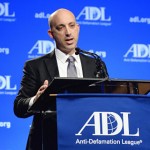by Mitchell Plitnick
I’d like to pose a question. Do you believe that someone who writes the following letter should be forced out of his position as chaplain at an Ivy League university?
To the Editor:
Deborah E. Lipstadt makes far too little of the relationship between Israel’s policies in the West Bank and Gaza and growing anti-Semitism in Europe and beyond.
The trend to which she alludes parallels the carnage in Gaza over the last five years, not to mention the perpetually stalled peace talks and the continuing occupation of the West Bank.
As hope for a two-state solution fades and Palestinian casualties continue to mount, the best antidote to anti-Semitism would be for Israel’s patrons abroad to press the government of Prime Minister Benjamin Netanyahu for final-status resolution to the Palestinian question.
(Rev.) BRUCE M. SHIPMAN
Groton, Conn., Aug. 21, 2014
One can, to be sure, disagree with the opinion Bruce Shipman, a former chaplain from Yale, expressed—I certainly do. Anti-Semitism is not the same as opposition to Israeli policies, the two are quite distinct and plenty of Jew-haters fully support even more aggressive and brutal policies either because they hate Muslims and Arabs more than Jews or because they have some apocalyptic vision of where such Jewish behavior might take the Jews.
Anti-Semitism does not increase due to Israel’s behavior. Anti-Semitic activity might, as haters see an opportunity to cloak their hate in something else. But bigotry has a life of its own. More to the point, Israelis will not behave like “good Jews” in order to stem a theoretical rising tide of anti-Semitism. That’s not why Israel should end its occupation, should end its siege of Gaza, and should recognize, with full faith, that Palestinians have the same national, civil and human rights as Israeli Jews. Politics doesn’t work this way, but civil society should be pushing for these things because they are a moral imperative. And Israel should pursue such a course because it is the only way its citizens will ever know peace and security.
So, yes, I think Shipman was wrong. But he was hardly expressing hatred towards Jews. He was speaking out of obvious concern for both Israelis and Palestinians and a hope for a peaceful resolution to the conflict. He may have been wrong about Israeli actions causing anti-Semitism, but he is not the only person who believes this and there is room for reasonable debate on that point. In any case, he was certainly not saying that Israel’s actions justified anti-Semitism. And yet, he was forced to resign.
Is this really where we’ve ended up? Yes. Ideas are fully policed on this issue. Academia, which is precisely the place that disagreements, and especially controversial ideas, are supposed to be debated with civility, has become one of the most heavily policed arenas. The recent controversy at the University of Illinois, where Professor Steven Salaita was “de-hired” because of his outspoken statements on Twitter about Israel’s massive onslaught on Gaza, has now grown to the point where it is threatening the university’s administration. Yet they have not reversed their decision to date.
It’s not like controversial views on both sides of the Israel-Palestine conflict are under such attack. Thane Rosenbaum, for example, called on Israel to kill Palestinian civilians. His op-ed in the Wall Street Journal generated a lot of controversy, but his position at New York University’s School of Law was never in danger, and I wouldn’t want it to be.
Opinions, even hateful ones, need to be out in the open. How can they otherwise be countered? Instead, when it comes to Israel, we have gone entirely in the other direction, but only on one side of the question.
Bruce Shipman, apparently, resigned “voluntarily,” not wanting to create or be in the middle of further controversy at Yale. But there never should have been any such pressure on him. There is no conceivable stretch that can turn what Shipman wrote, regardless of how much anyone disagrees with him, into hate speech. Short of that, any individual should be able to express an opinion. That is especially true about community leaders, which school chaplains obviously are, and the academic world.
So enough with the false allegations of anti-Semitism, which are insulting to those like myself who have experienced physical violence from anti-Semitism. Enough with the extremists supporting the worst Israeli policies who—apparently knowing that their case cannot withstand open debate—threaten and pressure those who raise opposing opinions (I have received death threats from such people as well).
It’s high time for everyone to agree that ideas can and should be debated. Islamophobes and others who do not acknowledge Palestinians’ basic human rights have a national platform with FOX News. More legitimate defenders of Israeli policies and those who are deeply opposed to those policies should also be able to voice their views in public. Everyone who is interested in the Israel-Palestine conflict should agree with this fair and just principle. The only ones who can’t, it would seem, are the naysayers who oppose legitimate debate. I wonder why.






it doesn’t matter if jews are khazars and muslims are semites. the term anti-semites refers to jews. arguing on a technicality to negate antisemitism is pointless
Mike: you owe no one an apology for being a human being. That is what unites us all. Accidents of birth at locations you had no choice over and being inducted into a religion you never chose for yourself is no basis for anyone to expect any apologies from you for anything.
ernie: The term semite relates to language not to religion. Palestians are semites because their Arabic language is semitic, as is the Hebrew. language.
The use of the term antisemitic only dates from the middle of the 19th Century and is an artifical term which is irrational and meaningless.
If people wrongly hate other people because of their religious beliefs – Judaism in this specific case – then they are engaging in religious- or Jew-hatred, not antisemitism.
Mitchell rightly says that, “There is no conceivable stretch that can turn what Shipman wrote, regardless of how much anyone disagrees with him, into hate speech. Short of that, any individual should be able to express an opinion.” Then my friend references “Thane Rosenbaum, for example, called on Israel to kill Palestinian civilians. His op-ed in the Wall Street Journal generated a lot of controversy, but his position at New York University’s School of Law was never in danger, and I wouldn’t want it to be.” Why wouldn’t advocating the killing of Palestinian civilians qualify as hate speech and therefore be beyond the pale?
The ongoing effort in America to suppress free speech, as part of programme of encouraging Israel to grow its illegal colonies in the West Bank, is dismaying and dangerous to the national security interests of the US.
This is a thoughtful commentary. However, I read Mr. Shipman’s statement differently. I don’t see it as an attempt to equate antisemitism with opposition to Israeli policies, but rather to point out that those policies – specifically, the brutality of the Occupation and the carnage in Gaza- have had the effect of encouraging, if not causing, some (especially those so predisposed) to express anti-semitic sentiments and commit anti-semitic acts. I tend to agree with that observation, and worry that if Israel continues on its present course, it could trigger an even nastier backlash against those of the Jewish faith even though the religion is, and must be treated as, distinct from the policies.
What makes this even more problematic is that it is Netanyahu’s position, and that of the mainstream Israeli Lobby, that Israel is a Jewish State- i.e., that its Statehood is indivisible from its “Jewishness”- and that it must be accepted as such by the Palestinians and the rest of the world.
It is further exacerbated by reports of some Jewish clergy in Israel, including those counseling the IDF, as well as reports of many IDF soldiers, and many other Israeli citizens, expressing extremist views about Jewish “exceptionalism” and the diminished humanity of their Palestinian population, even to the extent of advocating the ethic cleansing or elimination of the Palestinians as a final solution to clear the land and its coast for an Eretz Israel.
It is this intentional intertwining of religion with polity that can be expected to cause confusion among some, and throw oil on the fire for others inclined to racism or bigotry.
For Shipman to observe such a connection and express it in a succint letter, and then be forced, or encouraged to resign because of it, shows me that there is also racism and censorship of the most pernicious sort on the other side, and that it reaches all the way to the top of our most prestigious universities.
I’m sorry Shipman resigned. Had William Sloane Coffin still been at Yale, I suspect he would have dug in his heels and confronted the issue head-on in a positive way as one that needed moral inquiry and moral leadership. I also suspect that Shipman did not get the support he should have received from the Yale administration and its Board of Trustees